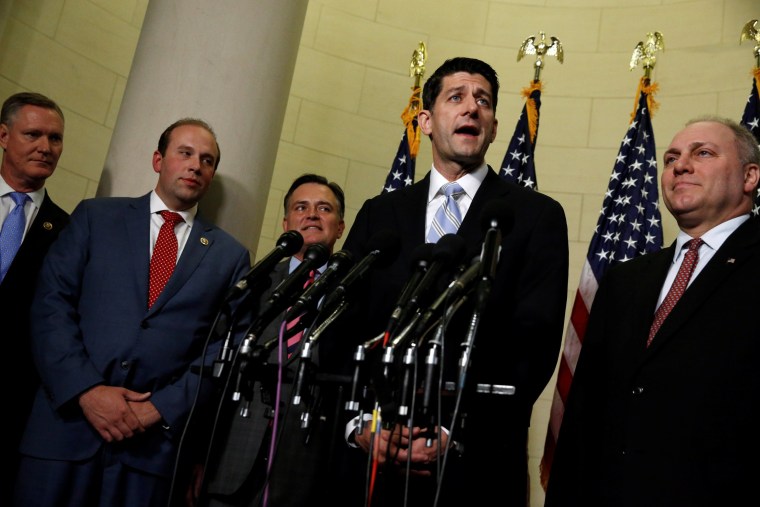Facing fierce criticism from members of both parties — including President-Elect Donald Trump — House Republicans backed down Tuesday from an attempt to gut an independent ethics office that investigates House lawmakers and staff accused of misconduct.
The decision to scrap changes to the ethics office came during an emergency GOP conference meeting Tuesday morning. Just hours earlier, Trump fired off a pair of tweets criticizing the timing of the Monday-night vote by House Republicans to place the Office of Congressional Ethics, known as OCE, under the jurisdiction of the House Ethics Committee.
It was a notably tepid response from a president-elect who ran on a campaign platform of ethics reform, pledging to "drain the swamp" in Washington, but a signal of how the issue was becoming a political distraction.
The scramble by House Republicans over the rules change marred an otherwise successful first day back that saw Wisconsin Rep. Paul Ryan win reelection as Speaker of the House with just one Republican defection.
That vote was a show of strength for the Speaker, who faced questions over his leadership after sparring with President-Elect Donald Trump during the campaign cycle — questions that were compounded by the Monday-night vote to gut the OCE. Ryan opposed the rule change and spoke out against it, so its initial inclusion signaled both a rebuke to the Speaker and a failure of his whip operation.
And while House Leadership ultimately prevailed in tabling the rules changes for now, the move sparked widespread criticism and drove headlines that overshadowed Republicans’ first day back in control of Congress.
Democrats seized on the Monday night vote as evidence Republicans plan to "engage in the same corrosive and unethical behavior that led to the creation of the Office of Congressional Ethics in the first place," as a spokesman for the House Democrats' campaign arm put it in a statement.
"This is a shameless way to start the new Congress and every House Republican should immediately voice public opposition - and ultimately vote against - these shady rule changes," said Democratic Congressional Campaign Committee Spokesman Tyler Law.
Indeed, one of the figures that inspired the creation of the OCE — Republican lobbyist Jack Abramoff, who was indicted for his role at the center of a massive political corruption scandal in 2005 — said the timing of the move was “incredibly unwise.”
“I think unfortunately, it was incredibly unwise politically to make that one of the lead things that they were doing as a new Congress,” he said.
Abramoff said there was “some justification” behind the criticism of the OCE for conducting its investigations in such a public way, that sometimes hurt lawmakers without ultimately finding any wrongdoing. But he noted that voters went to the polls in part fueled by frustration with the way Washington works — and an effort to undermine government oversight seemed to ignore that.
“Don't they realize what the election was about in November? It was about that Americans are sick and tired of what goes on in Washington. So, this should not have been the first thing that people hear about,” he said.
The Abramoff scandal was just one of a rash of ethics scandals that plagued the GOP-led Congress at the time and helped deliver the House to Democrats during the 2006 elections. Then-House Speaker Nancy Pelosi created the OCE in 2008 as a response to what she characterized at the time as a “culture of corruption” that had taken over Washington
If passed, the measure would've given the ethics oversight and investigative role to the lawmakers themselves and prevented information about investigations from being released to the public.
Members of both parties have privately criticized the OCE as overly aggressive and at times unfair, subjecting them to public complaints (and eventually expensive legal bills) that often came to nothing. That was the case made by a number of Republican lawmakers at Monday night's Republican caucus meeting, where a majority of members in attendance voted to adopt the amendment.
Rep. Bob Goodlatte's office said the amendment, which he introduced, was intended to increase protection of due process rights for House representatives or staffers under investigation and grant them more access to basic "evidentiary standards."
But even those who agreed with the substance of the amendment acknowledged it was “very bad optics” for House Republicans to be seen as gutting an ethics watchdog on their first day back at work, as former Virginia Rep. Tom Davis put it.
“No member likes this thing,” he said, but “the optics are terrible.”
Davis, who was on Capitol Hill Tuesday conferring with members of both parties about legislative priorities ahead, said to get beyond the negative headlines of the day Republicans “need to move forward with their agenda immediately…do what they were elected to do.”

